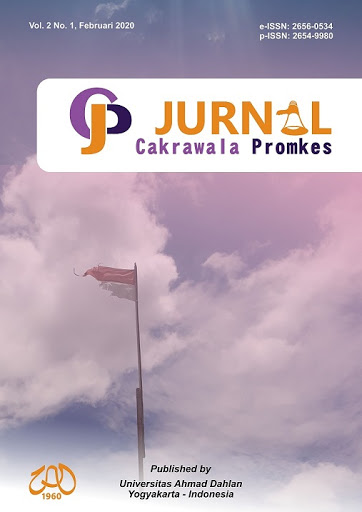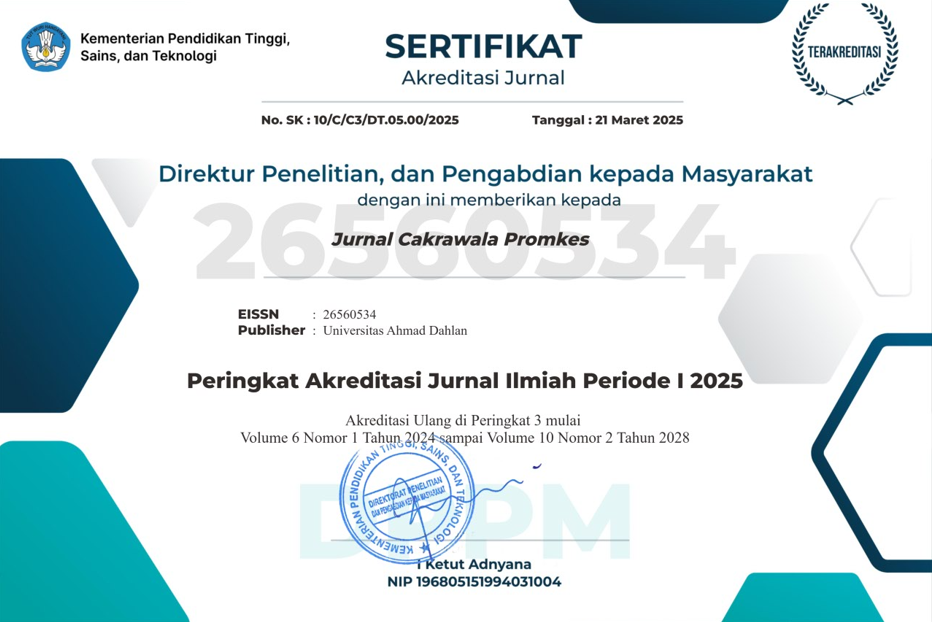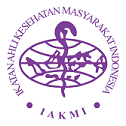Pengalaman pemberian ASI ekslusif pada Ibu bekerja: scoping review
DOI:
https://doi.org/10.12928/promkes.v3i2.4574Keywords:
1. Work* mother*OR Work* mom* 2. Breastfeed* OR exclusive breastfeed* 3. Implementation* OR Application* OR Practice* 4. Experience* OR support* OR view* factor*Abstract
Working mothers faced many challenges and constraints. Despite legislations mandating workplaces to give support, including breastfeeding areas for their employees, a number of hurdles remained, preventing them from achieving exclusive breastfeeding (EBF). Therefore, this review intended to review evidence on the experience of EBF practices among working mothers. This study employed scoping review by using four stages. Firstly, develop the focus of the study through the framework of PEOS (Population, Exposure, Outcome and study design). Secondly, conducted literature search using three relevant databases (PubMed, Science Direct, Wiley Online) and grey literature (Google scholar). Thirdly, selected relevant studies using inclusion and exclusion criteria. Fourthly, conducted critical appraisals using data charting to assess the quality of included articles, followed by analyzing and reporting the results. PRISMA flowchart was used to describe the literature search plot. Based on 12 included articles, twothirds of the included articles were qualitative studies categorized as grade A. The other four articles had grade B where three out of four were non-randomized quantitative studies and one mixed-method study. Some factors identified to be the cause to prevent continued EBF were insufficiency support and facilities from family, husband, coworkers in the workplaces (paid leave, availability of daycare, lactation room, breast milk pumping tools). Two other identified factors were previous breastfeeding experience and knowledge. The implementation of EBF practices were challenging in some developed countries. However, having good knowledge was necessary to reduce the gap between maternal perception and belief in which was occurred in Italy study. In contrary, low knowledge was found as an important obstacle in the developing world such as Bangladesh. Overall, perception and belief related to EBF of working mothers contributed to the practice of EBF.
References
2. Kemenkes RI. Profil Kesehatan Indonesia Tahun 2019. Kementrian Kesehatan Repoblik
Indonesia. 2019.
3. Siregar MA. Pemberian ASI Eksklusif dan Faktor-faktor yang Mempengaruhi. Gizi. 2014;
4. Anggraeni IA, Nurdiati DS, Padmawati RS. Keberhasilan ibu bekerja memberikan ASI
eksklusif. J Gizi dan Diet Indones (Indonesian J Nutr Diet. 2016;
5. Novayelinda R. Telaah literatur : Pemberian ASI dan Ibu Bekerja. J Ners Indones.
2012;2(2):177–84.
6. Astuti AW, Morgan R. Interventions analysis of addressing exclusive breastfeeding (EBF)
barriers to improve EBF coverage among industrial women employees in indonesia. J Heal
Technol Assess Midwifery. 2018;1(1):1–16.
7. Agustia N, Machmud R, Usman E. Faktor yang Berhubungan dengan Pemberian ASI
Eksklusif pada Ibu Bekerja di Kabupaten Ogan Komering Ulu. J Kesehat Andalas. 2019;
8. Charlick SJ, McKellar L, Gordon AL, Pincombe J. The private journey: An interpretative
phenomenological analysis of exclusive breastfeeding. Women and Birth. 2019;
9. Askey, H. O’Malley L. Scoping studies: towards a methodological framework. Int J Soc Res
Methodol. 2009;
10. Hong Q, Pluye P, FÃ bregues S, Bartlett G, Boardman F, Cargo M, et al. Mixed Methods
Appraisal Tool (MMAT), Version 2018. User guide. McGill. 2018;1–11.
11. Nkrumah J. Maternal work and exclusive breastfeeding practice: A community based
cross-sectional study in Efutu Municipal, Ghana. Int Breastfeed J. 2017;
12. Cervera-Gasch Ã, Mena-Tudela D, Leon-Larios F, Felip-Galvan N, Rochdi-Lahniche S,
Andreu-Pejó L, et al. Female employees’ perception of breastfeeding support in the
workplace, public universities in Spain: A multicentric comparative study. Int J Environ
Res Public Health. 2020;
13. Dun-Dery EJ, Laar AK. Exclusive breastfeeding among city-dwelling professional working mothers in Ghana. Int Breastfeed J. 2016;
14. Abekah-Nkrumah G, Antwi MY, Nkrumah J, Gbagbo FY. Examining working mothers’
experience of exclusive breastfeeding in Ghana. Int Breastfeed J. 2020;
15. Riaz S, Condon L. The experiences of breastfeeding mothers returning to work as hospital
nurses in Pakistan: A qualitative study. Women and Birth. 2019;
16. Mabaso BP, Jaga A, Doherty T. Experiences of workplace breastfeeding in a provincial
government setting: a qualitative exploratory study among managers and mothers in
South Africa. Int Breastfeed J. 2020;
17. Valizadeh S, Hosseinzadeh M, Mohammadi E, Hassankhani H, M. Fooladi M, Schmied V.
Addressing barriers to health: Experiences of breastfeeding mothers after returning to
work. Nurs Heal Sci. 2017;
18. Payne D, Nicholls DA. Managing breastfeeding and work: A Foucauldian secondary
analysis. J Adv Nurs. 2010;
19. Hasan AMR, Smith G, Selim MA, Akter S, Khan NUZ, Sharmin T, et al. Work and breast milk
feeding: a qualitative exploration of the experience of lactating mothers working in ready
made garments factories in urban Bangladesh. Int Breastfeed J. 2020;
20. Truong Xuan NT, Nguyen NT. BREASTFEEDING EXPERIENCES OF WORKING MOTHERS IN
VIETNAM. Belitung Nurs J. 2018;
21. Sari Y, S. Y, V. N. The exclusive breastfeeding experiences of working mothers in West
Sumatera (Sumbar) Peduli ASI community. Int J Res Med Sci. 2015;
22. Chen J, Xin T, Gaoshan J, Li Q, Zou K, Tan S, et al. The association between work related
factors and breastfeeding practices among Chinese working mothers: A mixed-method
approach. Int Breastfeed J. 2019;
23. Cascone D, Tomassoni D, Napolitano F, Di Giuseppe G. Evaluation of knowledge, attitudes,
and practices about exclusive breastfeeding among women in Italy. Int J Environ Res
Public Health. 2019;
Downloads
Additional Files
Published
Issue
Section
License
Authors who publish with JCP: Jurnal Cakrawala Promkes agree to the following terms:
- Authors retain copyright and grant the journal the right of first publication with the work simultaneously licensed under a Creative Commons Attribution License (CC BY-SA 4.0) that allows others to share the work with an acknowledgement of the work's authorship and initial publication in this journal.
- Authors are able to enter into separate, additional contractual arrangements for the non-exclusive distribution of the journal's published version of the work (e.g., post it to an institutional repository or publish it in a book), with an acknowledgement of its initial publication in this journal.
- Authors are permitted and encouraged to post their work online (e.g., in institutional repositories or on their website) prior to and during the submission process, as it can lead to productive exchanges, as well as earlier and greater citation of published work.

This work is licensed under a Creative Commons Attribution-ShareAlike 4.0 International License












